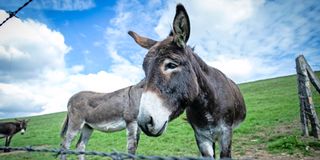Institution calls for sustained efforts to boost donkey numbers

Donkeys in a farm. Brooke East Africa, an animal rights initiative warns that donkey numbers are fast declining threatening the extinction of the animal.
What you need to know:
- Elijah Mithigi, the programmes manager at Brooke East Africa, which deals with donkeys, said the dwindling number of the animal is a concern.
- The breeding of donkeys is painfully challenging, from conception to birth, making large-scale commercial production very difficult.
- Kenya has become the epicentre of donkey trade, with 15 per cent of the country’s donkey population being slaughtered between April 2016 and December 2018.
The current rise in trade of donkey skin threatens the species and livelihoods of communities dependent on the animal, a lobby organisation has said.
Elijah Mithigi, the programmes manager at Brooke East Africa, which deals with donkeys, said the dwindling number of the animal is a concern, noting sustained breeding is an option to help boost the species.
“Many keep donkeys only for work, these animals thus tend to breed slowly because they get conditioned to preserve their energy for work purposes and not breeding,” he said.
At this time when a government ban on slaughter stands, increased breeding will help boost the numbers.
Epicentre of illegal donkey trade
The breeding of donkeys, however, is painfully challenging, from conception to birth, making large-scale commercial production very difficult.
Mithigi advised farmers to feed their donkeys well as well as reduce workload, especially for the females.
“There are also farmers who have been giving their donkeys some ‘substances’ to ensure they do not get on heat so that they only work. This means there is no reproduction and hence donkey numbers do not grow. Farmers must avoid such practices,” said Mithigi.
Kenya has become the epicentre of donkey trade, with 15 per cent of the country’s donkey population being slaughtered between April 2016 and December 2018.
In the two years, at least 310,000 donkeys had been slaughtered, leading to massive decline in the number of the animals.





